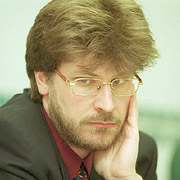© «Russia
in Global Affairs». № 3, July — September 2005

Thirty
years ago, on August 1, 1975, the leaders of 35 countries gathered
in Helsinki to sign the Final Act of the Conference on Security and
Cooperation in Europe. This document fixed the geopolitical status
quo in the Old World – a goal pursued by the Soviet Union – and, at
the same time, introduced a new notion into international politics
– the ‘third basket,’ that is, humanitarian issues and human
rights, which Moscow formally pledged to observe.
The
“inviolability of frontiers,” the prime goal of the participating
nations, failed to withstand the test of time. Human rights and
democratic freedoms, however, have become effective instruments
that are capable of radically changing the international
geopolitical landscape. “It still remains a mystery to me how the
Final Act, with its humanitarian ‘heresies,’ successfully passed
through the Politburo of the Soviet Communist Party,” Russian
veteran diplomat Anatoly Adamishin, who was present at the birth of
the Helsinki process, ponders in his article. He argues that the
decisive role during those negotiations belonged to Communist Party
liberals who had a large amount of influence on General Secretary
Leonid Brezhnev. They believed that “the movement toward the
observance of human rights was not a concession to the West but an
indispensable prerequisite for the country’s
development.”
Conservatives in the Kremlin immediately raised the alarm, and
their intuition did not betray them: Moscow’s commitments soon were
made an instrument of pressure from abroad and from the growing
human rights movement inside the country. And although the collapse
of the Soviet Union 15 years later was caused, above all, by
economic factors, the ‘third basket’ played a role, too, as it
helped destroy the ideological monopoly.
The ‘third
basket’ gave rise to powerful nongovernmental organizations which
now play an ever growing role in global politics. At the beginning
of the 21st century, the ruling regimes of various countries have
been pushed out of power by slogans which embrace the common human
values of freedom and democracy. In some countries, these political
changes came about from the external use of force (as in the Middle
East); in other cases, the ruling regimes fell under the pressure
of domestic revolutionary developments (as in some of the former
Soviet republics).
In Russia,
the “values” issue arouses special interest. Some people are
concerned by the present government’s departure from democratic
ideals, while others fear the possible use of the human rights
argument for imposing alien interests and development models on the
country. Both politicians and experts actively discuss the
“uniqueness” of Russia, which many believe cannot follow any other
path of development but its own. The ideologist of New
Isolationism, Mikhail Yuryev, argues that the development of the
Russian nation is possible only through the establishment of
insurmountable civilizational barriers. Alexander Muzykantsky
admits that the Russian mentality differs from the Western
mentality, but he is confident that Russia can take avail of these
differences for its successful modernization. Well-known politician
Grigory Yavlinsky and Andrei Illarionov, the Russian president’s
economic advisor, share their views on the changes facing Russia,
while economist Vladimir Mau warns against a “natural resource
euphoria” and cites examples from the past to prove his
position.
The issue
of ‘Russia’s path’ always gives rise to discussions about its place
in the world – whether it belongs to Europe or Asia, or whether it
represents a special type of civilization. Moscow’s relations with
the European Union were the focus of attention of a recent workshop
headed by Sergei Karaganov and attended by major Russian experts.
Arkady Moshes emphasizes the opportunities that would open up for
Russia if it proclaims a “European choice.” Sergei Chugrov looks at
the Asian vector of Russia’s policy and its relations with Japan.
Businessman Vladimir Yevtushenkov urges Moscow to return to the
Arab world – where the Soviet Union had firm positions in the
second half of the 20th century – as an active player.
As for the
other articles that appear in this issue, I would emphasize the
debate between Swedish diplomat Lars Fredén and his Russian
colleague Mikhail Demurin which considers whether Russia should
show repentance to the Baltic States. Norway’s Prime Minister Kjell
Magne Bondevik writes about Oslo’s experience in the peace
settlement of internecine conflicts in various countries. Alexei
Arbatov raises an uncommon subject as he discusses the feasibility
of keeping nuclear weapons under democratic control. Yevgeny
Satanovsky paints a gloomy picture of the Middle East’s future,
while Olga Butorina and Alexander Zakharov discuss the prospects of
integration in the post-Soviet space.
National Interest










